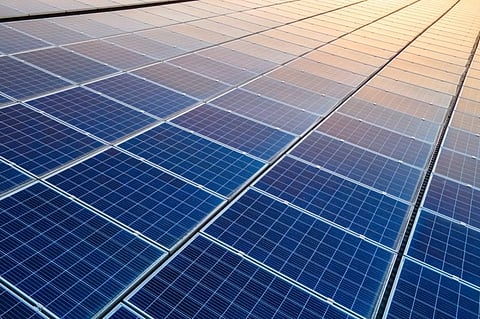Discovery challenges Eskom with R10bn solar and wind projects powering big business
Key topics:
Discovery Green to resell power from 335MW Mpumalanga solar farm
R10bn projects to supply top SA businesses, cut CO2 by 1.15m tonnes
Eskom fights private traders as competition threatens revenue base
Sign up for your early morning brew of the BizNews Insider to keep you up to speed with the content that matters. The newsletter will land in your inbox at 5:30am weekdays. Register here.
Support South Africa’s bastion of independent journalism, offering balanced insights on investments, business, and the political economy, by joining BizNews Premium. Register here.
If you prefer WhatsApp for updates, sign up to the BizNews channel here.
Discovery’s renewable energy business will resell power from a large solar farm under construction in Mpumalanga to businesses traditionally considered valuable to state-operated electricity utilities.
Under a 20-year power purchase agreement, Discovery Green is buying electricity from Red Rocket’s Tournee Solar Park near Standerton. Commercial operations at the facility are planned to start in 2027.
The farm will have a capacity of 335MW, making it one of South Africa’s largest renewable power projects.
It will consist of approximately 463,000 bifacial ground-mounted solar modules and connect to the national grid via a 132kV overhead powerline.
Discovery Green’s head of actuarial, research, and design, Dan Ginsberg, said the project was an exciting benchmark for the industry.
“In terms of size, it is equivalent to 800 rugby fields and is designed for maximum efficiency and long-term reliability, delivering clean power at a scale that few projects have achieved,” he said.
Discovery said the farm is expected to generate 720 million kWh (720GWh) of energy over its 20-year lifespan and offset 709,000 tonnes of carbon dioxide equivalent emissions (CO2e) annually.
The facility was financed through a club deal arranged with Absa Bank, Standard Bank and the Development Bank of Southern Africa.
Discovery Green Andre Nepgen said that signing the PPA at an early stage locked in long-term price certainty for the division’s clients.
“Affordable clean energy is the foundation for business productivity, expansion and job creation, and Tournee allows us to deliver exactly that and support the country’s growth,” Nepgen said.
“Our partnership with Red Rocket combines their expertise in developing and delivering renewable energy projects with our focus on delivering clean energy to businesses of all sizes.”
The solar farm is Discovery Green’s second renewable energy project with Red Rocket.
The company will be buying electricity from the 400MW Overberg Wind Farm, which is also set to begin commercial operation in early 2027.
Red Rocket CEO Matteo Brambilla said the Discovery Green projects represent an investment of around R10 billion and will generate energy on a scale comparable to powering more than 369,000 homes.
Taking Eskom customers
Discovery Green is one of several recently licensed energy traders who will compete with Eskom and municipal utilities over the coming years.
The company will sell Red Rocket’s electricity to leading mining, manufacturing, property and hospitality businesses, which are valuable customers for traditional utilities.
Among Discovery Green’s confirmed customers are Impala Platinum, Southern Sun, Fortress REIT, Balwin Properties, KP Lime, and The Capital Hotels and Apartments.
Read more:
“From 2027, these clients will receive power from Tournee and Overberg, collectively cutting an estimated 1.15 million tonnes of CO2e emissions annually,” the bank said.
State-operated utilities are keenly aware of the impact that private traders like Discovery Green will have on their revenues.
Eskom has launched a legal challenge against the National Energy Regulator of South Africa (Nersa) for awarding trading licences without a rules framework in place.
The South African Local Government Association, which represents municipalities, is backing Eskom. The entities claim to be concerned about private players “cherry-picking” their most valuable customers.
They also argue that these traders would not sell electricity to poor and lower-income customers, who they argue enjoy lower tariffs subsidised by larger customers.
With fewer reliable and consistent customers, the utilities would have to implement substantial tariff hikes, which could lead to their dwindling customer bases going off-grid or bypassing their connections.
Many municipalities derive a substantial portion of their income from reselling and distributing electricity. Load-shedding drove them to seek alternative income streams, including taxing fibre networks.
Eskom’s arguments are tough to justify
However, energy expert Chris Yelland has called Eskom’s arguments in the matter “dangerously disingenuous” and accused the power utility of trying to defend its monopoly.
Yelland believes the real issue is that Eskom knows it cannot compete with private electricity traders and generators due to its bloated workforce, ineffective operations, and wasteful expenditure.
Webber Wentzel partner Mzukisi Kota has explained that the amended Electricity Regulation Act (ERA) gives Nersa the discretionary power to establish rules.
However, these are not required before granting trading licences. The ERA already sets out the licensee’s obligations, so there is no regulatory gap in the legislation.
Kota believes that Eskom’s position may be difficult to justify given the current regulatory environment and its conflict with competition law.
This article was first published by MyBroadband and is republished with permission

